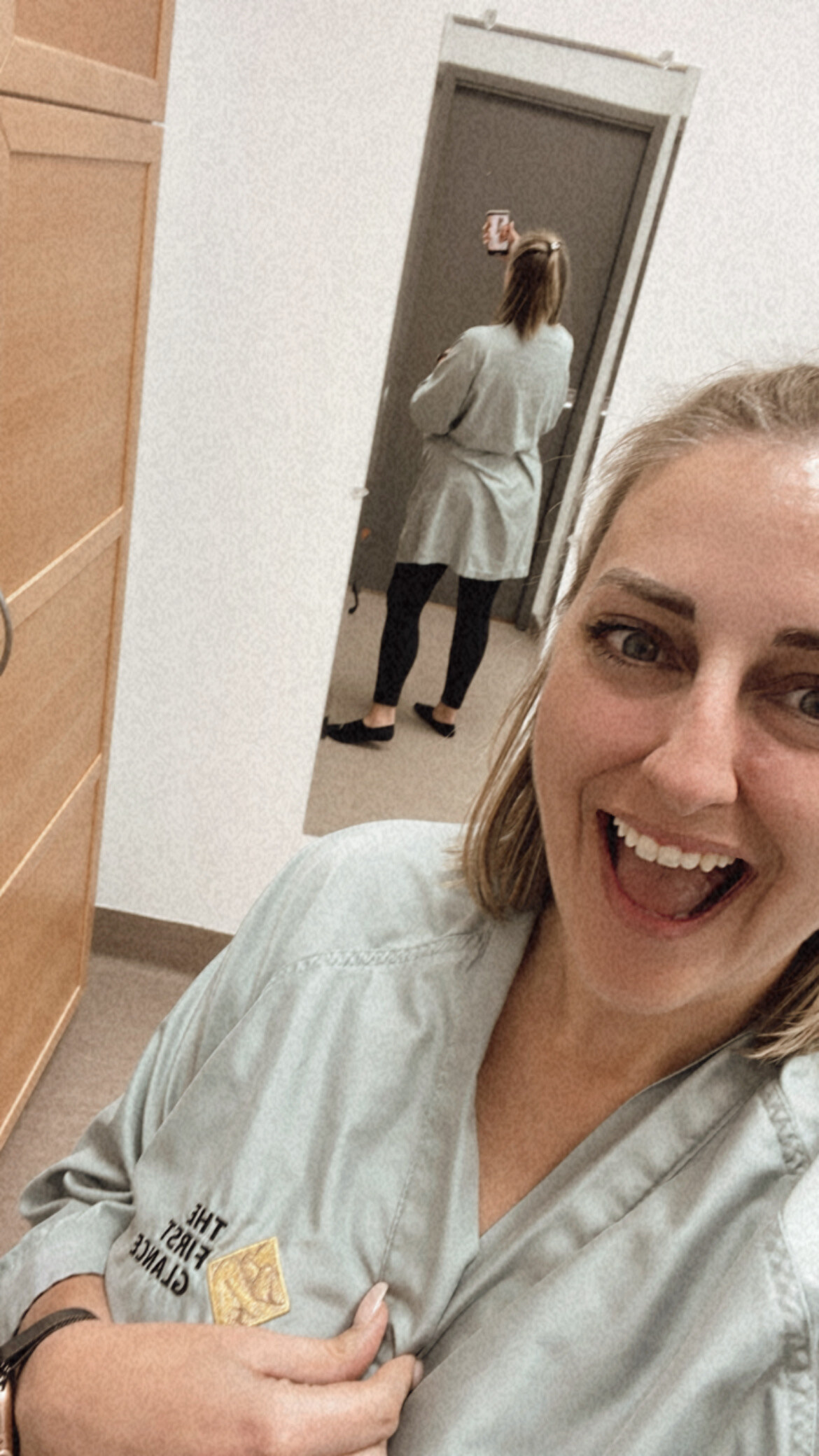From Operating Room to Recovery: What to Expect on Surgery Day
Jun 14 2024 • Written by: Kate Hanson

Discover how mental preparation can positively impact your surgical experience and recovery.
From Operating Room to Recovery: What to Expect on Surgery Day
The Night Before
Let’s talk about the night before. You know that feeling when you’re about to embark on a big adventure or you're in line for the biggest, fastest rollercoaster? The nerve-citement is real! That was me to a tee. I felt every flutter and restlessness, but I chose to see this mix of nerves and excitement as a healthy preparation for a procedure I’d wanted for easily 20 years. It's all part of the human experience when you're taking a leap toward your dream life. Just remember to stick to your surgeon’s guidelines—no late-night snacks!
The Morning Of
Morning arrived, and I was up before the crack of dawn. Feeling like a kid on the first day of school, except this time, it was my husband dropping me off at the back of the building where I was getting my surgery done. I took a moment to center myself, threw on some cozy and loose clothes (button-up shirt, a must!), and made my way to the surgeon's office.
Check-In and Pre-Op
Checking in was surprisingly smooth, akin to a hotel check-in, minus the complimentary shampoo. I met with an incredible nurse who walked me through all the steps I needed to follow to get ready for surgery. I was taken to a quiet little room where they asked me to take off all my clothes (I confirmed with the nurse that I could keep my underwear on, since my surgery was all top—haha). They provided me with a hospital gown and some compression socks to put on. To my delight, they also gave me a warmed, fuzzy blanket while I waited for the anesthesiologist.
The nurse checked on me one last time and asked how I did with putting the socks on. I told her it was a little tricky (because they are so tight), and she giggled, letting me know that I had put them on upside down. We both cracked up!
Meeting the Anesthesiologist
Next up was meeting the anesthesiologist, my ticket to the land of sweet dreams. We discussed my health history, and he walked me through the procedure, explaining everything thoroughly and making me feel very relaxed. Then he ended with, "Just before we go into the operating room, I should probably share the highly unlikely, but possible, potential risks associated with general anesthesia."
Since this was my first time having surgery, I decided to mentally go somewhere else while he covered those possibilities. It also explained why you should absolutely listen when they say not to eat before surgery. Goodness gracious!
The Operating Room
The operating room was a hive of activity. Nurses bustled in and out, taking my vitals, asking questions, and setting me up with various monitors. I felt like a participant in a science experiment, but it was oddly reassuring. The friendly atmosphere helped ease my nerves. After I was transferred to the operating table, I thought I would crack a couple of jokes—you know, as one does before a significant surgery.
I asked everyone in the room if it was too late to change my mind. Everyone stopped in their tracks and stared at me in silence. I quickly told them I was joking, and they immediately resumed their activities. I assured them I was known for making bad jokes at inopportune times. Not completely deterred by this experience, I went on to ask my anesthesiologist if this was his first day (he was an older gentleman, but you never know). He replied, "Not at all." After a brief pause, he added, "I practiced on some oranges this past weekend." Proud of our humorous exchange, we both giggled together, and then the anesthesiologist worked his magic. Before I knew it, I was out like a light.
Waking Up in Recovery
Waking up was a bizarre feeling. One moment, I was in the deepest sleep I’ve ever known, and the next I was in the recovery room, feeling groggy and slightly disoriented. The nurse, whom I’ll call J, was hands down one of the nicest women I’ve ever met. As soon as I told her I felt a little warm, she placed a cold cloth on my forehead. When I mentioned feeling dizzy, she immediately reclined my chair slightly. She was competent, kind, and very reassuring.
J informed me that my husband had arrived to pick me up. When he walked into the room, she said, “Wow Kate, you were right! He is handsome and he does have a beautiful smile.” Kyle blushed, and I didn’t even remember saying that in the first place. J then told Kyle that I had woken up telling her jokes and trying to make her laugh. I mean, it’s possible—haha.
Just like that, I slid into our car with J supporting me the entire time. I waved goodbye and told her she was the second-best nurse in the world (my mom is number one, of course). Pro tip: bring a pillow for the car ride—it cushions the bumps!
The First 24 Hours at Home
My mom and husband were phenomenal, checking on me regularly, offering water, and ensuring my comfort. Pain? Barely. All I remember is wanting to continue sleeping because I could barely keep my eyes open. Once I awoke from another long sleep, there may have been some mild discomfort, but it was manageable, and they had medications at the ready. I felt groggy and slightly disoriented for the first few hours at home, but I was grateful that the surgery was behind me.
The initial night at home revolved around rest and adhering to the doctor’s orders. My pillow fort on my bed became my safe haven. With pain meds, water, and snacks within reach, I experienced moments of discomfort, but nothing insurmountable. Netflix served as a welcome distraction—as long as I could keep my eyes open.
Tips for a Smooth Immediate Recovery
- Stay on Top of Pain Meds: Adhere to the prescribed medication regimen. It’s easier to manage pain before it escalates. I used an app on my phone to send me reminders of when to take my different meds.
- Hydrate and Eat Light: Provide your body with the nourishment it needs by drinking ample water and opting for easily digestible foods. I did choose some comfort snacks in between, but I felt better when I kept it light.
- Rest, Rest, Rest: Your body underwent significant stress, so bless it with the time it needs to recuperate. Listen to your body’s cues and avoid overexertion. After four months with a pinched nerve in my lower back, I felt like I had trained for this moment.
- Follow Post-Op Instructions: This is crucial for optimal recovery. Your surgeon’s directives on wound care, activity levels, and follow-up appointments are paramount. I did not want to shower two days after my surgery, fearing the water running down open incisions. However, once I finally got myself into the shower, it was complete bliss. Warm water is always comforting to me. It's a quick rinse, but it still brings you back to life.
Final Thoughts
Surgery day can feel like a whirlwind, but understanding what lies ahead can alleviate some of the apprehension. From pre-op preparations to the recovery phase, each stage brings you closer to the rejuvenated version of yourself that you have been dreaming of. As soon as I awoke in the recovery room, I felt relief in my back and shoulders. It was immediate relief from the pressure and pain I had dealt with for as long as I can remember.
Embrace the nerves, trust in the process, and take each step in stride. Before you know it, you’ll be on the other side, flaunting your new look and feeling like a million bucks. I have never talked so much about boobs in my life, and I can't seem to stop. I just want to tell anyone and everyone. If you are on the fence about having this procedure and are negatively impacted by having a large chest, I say GO FOR IT! It feels like the best decision I have made in a long time
Ready to Transform your Business with Little Effort Using Vertical?
Kate Hanson
Kate is a seasoned coach and founder of KHC as well as RaisCo Coaching, dedicated to helping individuals and businesses achieve their highest potential. With years of experience in life, business, confidence, wellness, and success coaching, Kate has guided countless clients toward their goals through personalized strategies and actionable insights.
